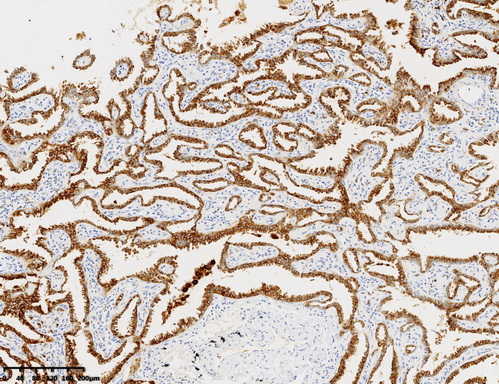NAPSIN A (NAPSA) Mouse Monoclonal Antibody [Clone ID: OTI3G2]
CAT#: CF813601
Carrier-free (BSA/glycerol-free) NAPSA mouse monoclonal antibody, clone OTI3G2
Frequently bought together (3)
Transient overexpression lysate of napsin A aspartic peptidase (NAPSA)
USD 396.00
Other products for "NAPSA"
Specifications
| Product Data | |
| Clone Name | OTI3G2 |
| Applications | IHC |
| Recommended Dilution | IHC 1:1000 |
| Reactivities | Human |
| Host | Mouse |
| Isotype | IgG1 |
| Clonality | Monoclonal |
| Immunogen | Human recombinant protein fragment corresponding to amino acids 64-244 of human NAPSA (NP_004842) produced in E.coli. |
| Formulation | Lyophilized powder (original buffer 1X PBS, pH 7.3, 8% trehalose) |
| Reconstitution Method | For reconstitution, we recommend adding 100uL distilled water to a final antibody concentration of about 1 mg/mL. To use this carrier-free antibody for conjugation experiment, we strongly recommend performing another round of desalting process. (OriGene recommends Zeba Spin Desalting Columns, 7KMWCO from Thermo Scientific) |
| Purification | Purified from mouse ascites fluids or tissue culture supernatant by affinity chromatography (protein A/G) |
| Conjugation | Unconjugated |
| Storage | Shipped at -20°C or with ice packs, Upon delivery store at -20°C. Dilute in PBS(pH7.3) if necessary. Stable for 12 months from date of receipt. Avoid repeated freeze-thaws. |
| Stability | Stable for 12 months from date of receipt. |
| Predicted Protein Size | 45.4 kDa |
| Gene Name | Homo sapiens napsin A aspartic peptidase (NAPSA), mRNA. |
| Database Link | |
| Background | This gene encodes a member of the peptidase A1 family of aspartic proteases. The encoded preproprotein is proteolytically processed to generate an activation peptide and the mature protease. The activation peptides of aspartic proteinases function as inhibitors of the protease active site. These peptide segments, or pro-parts, are deemed important for correct folding, targeting, and control of the activation of aspartic proteinase zymogens. The encoded protease may play a role in the proteolytic processing of pulmonary surfactant protein B in the lung and may function in protein catabolism in the renal proximal tubules. This gene has been described as a marker for lung adenocarcinoma and renal cell carcinoma. [provided by RefSeq, Feb 2016] |
| Synonyms | KAP; Kdap; NAP1; NAPA; SNAPA |
| Reference Data | |
| Protein Families | Druggable Genome, Protease |
| Protein Pathways | Lysosome |
Documents
| Product Manuals |
| FAQs |
| SDS |
{0} Product Review(s)
0 Product Review(s)
Submit review
Be the first one to submit a review
Product Citations
*Delivery time may vary from web posted schedule. Occasional delays may occur due to unforeseen
complexities in the preparation of your product. International customers may expect an additional 1-2 weeks
in shipping.






























































































































































































































































 Germany
Germany
 Japan
Japan
 United Kingdom
United Kingdom
 China
China




